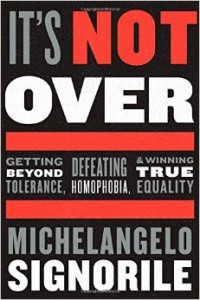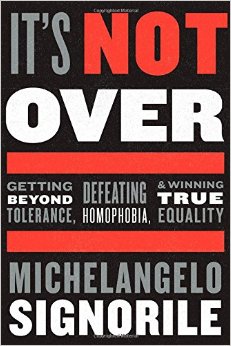 It’s Not Over: Getting Beyond Tolerance, Defeating Homophobia, and Winning True Equality
It’s Not Over: Getting Beyond Tolerance, Defeating Homophobia, and Winning True Equality
by Michelangelo Signorile
Houghton Mifflin Harcourt. 272 pages, $27.
A CELEBRATORY MOOD filled the nation after the Supreme Court’s ruling on same-sex marriage, and we are still basking in the afterglow as I write. A longtime supporter of marriage equality, Michelangelo Signorile celebrated with everyone else, but his joy was tempered with a cautionary tone that’s captured by his new book’s title: “It’s Not Over.” For all our recent victories in the courts, there’s still a huge amount of work to be done.
Signorile, currently editor-at-large for Huffington Post’s “Gay Voices” column, has written a number of other books over the past two decades that serve as calls to action for the GLBT movement, including 1996’s Outing Yourself: How to Come Out as Lesbian or Gay to Your Family, Friends and Coworkers, and 2003’s Queer in America: Sex, the Media, and the Closets of Power. What all of his books have in common is a reminder of the pitfalls of the closet and a plea for all GLBT people to be honest about their sexuality. It’s a theme he has pursued in numerous articles for The Advocate and Out magazine, and on his radio show, The Gist, which airs weekdays on Sirius XM radio in the U.S. and on-line globally.Despite victories in the Supreme Court culminating in the Obergefell v. Hodges ruling, we still don’t have a national Employment Non-Discrimination Act (ENDA), so gay people can still be fired from their jobs for being gay in most states. In many states they can be evicted from their dwellings or denied service at public accommodations. Signorile reports that transgender and gay youths have experienced an uptick in violence and bullying in many parts of the country, where homophobia has become more public and more violent in response to the increased visibility of gay and transgender people in the news and in everyday life. There’s still fierce opposition to GLBT equality in many religious communities, notably evangelical Protestantism, not to mention the Republican Party, whose gaggle of presidential candidates almost all oppose gay rights. There was a huge backlash after Lawrence v. Texas legalized same-sex sex in 2003. The backlash to Obergefell has begun as many states have begun to pass “religious freedom” laws that allow anti-gay discrimination as a matter of “personal conscience.”
Following the Obergefell ruling, there seemed to be general agreement among GLBT activists that the next item on the agenda should be passage of an ENDA-like piece of legislation at the national level. That ENDA was first introduced in Congress more than twenty years ago, that it’s no closer to passage today than it was back then, underscores Signorile’s point that there’s still formidable resistance to GLBT equality out there. And because it splits almost perfectly along party lines, passing a national civil rights bill—or amending the Civil Rights Act of 1964 to include “sexual orientation,” as has been proposed—will prove challenging. For this reason, progress in the short term is likely to come at the state and local levels, and Signorile applauds grassroots efforts to this end.
And there’s much more to be done beyond the ENDA front. Signorile lays out a kind of laundry list of unfinished business—creating safe schools for GLBT young people, working to change the atmosphere for gay athletes, fighting anti-gay sentiment in politics and the media, and encouraging the latter to cover our issues more responsibly—and he offers suggestions on how these goals might be achieved.





